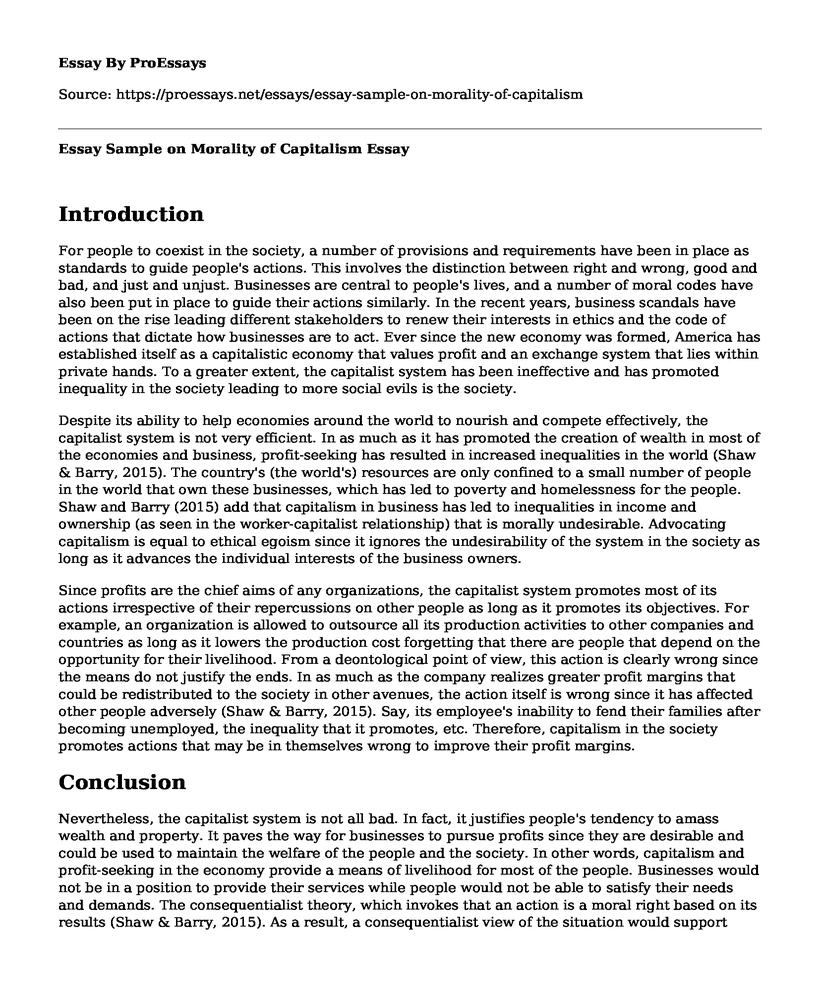Introduction
For people to coexist in the society, a number of provisions and requirements have been in place as standards to guide people's actions. This involves the distinction between right and wrong, good and bad, and just and unjust. Businesses are central to people's lives, and a number of moral codes have also been put in place to guide their actions similarly. In the recent years, business scandals have been on the rise leading different stakeholders to renew their interests in ethics and the code of actions that dictate how businesses are to act. Ever since the new economy was formed, America has established itself as a capitalistic economy that values profit and an exchange system that lies within private hands. To a greater extent, the capitalist system has been ineffective and has promoted inequality in the society leading to more social evils is the society.
Despite its ability to help economies around the world to nourish and compete effectively, the capitalist system is not very efficient. In as much as it has promoted the creation of wealth in most of the economies and business, profit-seeking has resulted in increased inequalities in the world (Shaw & Barry, 2015). The country's (the world's) resources are only confined to a small number of people in the world that own these businesses, which has led to poverty and homelessness for the people. Shaw and Barry (2015) add that capitalism in business has led to inequalities in income and ownership (as seen in the worker-capitalist relationship) that is morally undesirable. Advocating capitalism is equal to ethical egoism since it ignores the undesirability of the system in the society as long as it advances the individual interests of the business owners.
Since profits are the chief aims of any organizations, the capitalist system promotes most of its actions irrespective of their repercussions on other people as long as it promotes its objectives. For example, an organization is allowed to outsource all its production activities to other companies and countries as long as it lowers the production cost forgetting that there are people that depend on the opportunity for their livelihood. From a deontological point of view, this action is clearly wrong since the means do not justify the ends. In as much as the company realizes greater profit margins that could be redistributed to the society in other avenues, the action itself is wrong since it has affected other people adversely (Shaw & Barry, 2015). Say, its employee's inability to fend their families after becoming unemployed, the inequality that it promotes, etc. Therefore, capitalism in the society promotes actions that may be in themselves wrong to improve their profit margins.
Conclusion
Nevertheless, the capitalist system is not all bad. In fact, it justifies people's tendency to amass wealth and property. It paves the way for businesses to pursue profits since they are desirable and could be used to maintain the welfare of the people and the society. In other words, capitalism and profit-seeking in the economy provide a means of livelihood for most of the people. Businesses would not be in a position to provide their services while people would not be able to satisfy their needs and demands. The consequentialist theory, which invokes that an action is a moral right based on its results (Shaw & Barry, 2015). As a result, a consequentialist view of the situation would support capitalism since it will help achieve desirable results.
In consequence, though the consequentialist view of capitalism would find it okay since it results in desirable results, I do not think it should be promoted. The ends should not justify the ends since it may lead to immoral and unjustifiable actions. Some of the businesses would promote undesirable competition and unfair actions that would have severe repercussions on others.
References
Shaw, W. H., & Barry, V. (2015). Moral issues in business. Boston, MA: Cengage Learning.
Cite this page
Essay Sample on Morality of Capitalism. (2022, Mar 27). Retrieved from https://proessays.net/essays/essay-sample-on-morality-of-capitalism
If you are the original author of this essay and no longer wish to have it published on the ProEssays website, please click below to request its removal:
- Impact of Globalization on Emerging Markets - Essay Example
- Paper Example on Cultural Dimensions and Organization's Ethics Program
- Research Paper on Globalization: A Historical Perspective
- Essay on Exploring Global Commodity Chains & Globalization: Impacts on Products & Consumers
- Essay Example on Personal Identity: Locke vs Reid Debate
- The Great Recession: 10 Years of Economic Disparity - Essay Sample
- Essay Example on Women On Top: Managerial Strategies in Entrepreneur Sectors







